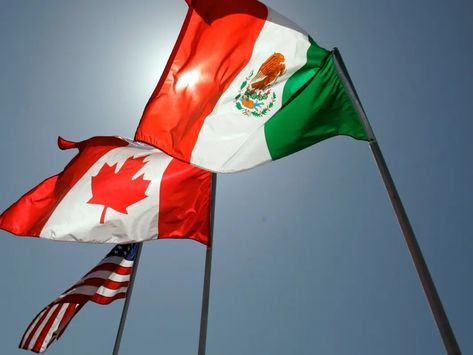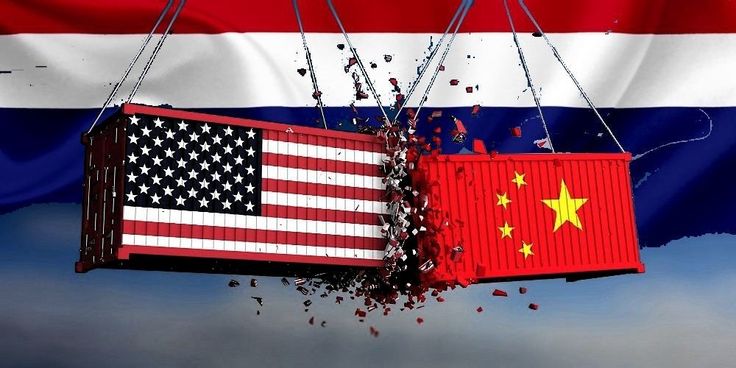The United States has imposed sweeping US tariffs on imports from Canada, Mexico, and China, intensifying global trade tensions and triggering immediate retaliatory measures from the affected nations. The newly enforced US tariffs include a 25% duty on a wide range of goods from Canada and Mexico, with Canadian energy products facing a slightly lower tariff of 10%. Meanwhile, US tariffs on Chinese imports have been raised from 10% to 20%. The Biden administration justified these actions as a necessary response to trade imbalances, economic security concerns, and efforts to curb fentanyl trafficking into the United States. These US tariffs, enacted under the International Emergency Economic Powers Act (IEEPA), were initially set to take effect earlier but were delayed following diplomatic negotiations.
Canada swiftly responded by imposing 25% tariffs on $100 billion worth of U.S. goods, with plans to expand them to another $100 billion in the following weeks. The Canadian government has targeted American products such as liquor, vegetables, clothing, shoes, and perfume, with potential future tariffs on consumer goods like household appliances and furniture. Prime Minister Justin Trudeau stated that Canada would “stand firm against unfair U.S. trade policies” and emphasized that these countermeasures are designed to protect Canadian businesses and workers. The move was met with strong opposition from U.S. trade representatives, who warned that these actions could further strain relations between the two neighbors.

Similarly, Mexico has taken retaliatory steps, with President Claudia Sheinbaum announcing a combination of tariff and non-tariff measures. While Mexico has not disclosed the full list of affected U.S. goods, reports indicate that tariffs of 5% to 20% could be imposed on American exports such as pork, cheese, fruits, vegetables, steel, and aluminum. The automotive industry, however, has been excluded from immediate tariffs, as Mexico remains a key hub for vehicle manufacturing and exports to the U.S. Sheinbaum described the U.S. tariffs as a “blatant violation” of the United States-Mexico-Canada Agreement (USMCA) and urged for high-level talks to prevent an all-out trade war. In response, U.S. trade officials dismissed Mexico’s concerns, arguing that the tariffs are legally justified under national security provisions.
Meanwhile, China has also hit back against the U.S. by imposing additional tariffs of 10% to 15% on American agricultural and food products, including chicken, soybeans, corn, dairy, and beef, effective from March 10. China’s Ministry of Commerce stated that these measures were “a direct response to American economic aggression” and that further countermeasures could be taken if the U.S. does not reverse its tariff hikes. Additionally, China has restricted 25 U.S. firms from doing business within its market, citing national security risks. The American agricultural sector is expected to take a significant hit, as China remains one of the largest buyers of U.S. farm products. Previous trade disputes between the two countries have already led to substantial losses for American farmers, and industry leaders are warning of further economic distress if the tariffs remain in place.
Global markets have reacted negatively to the escalating trade disputes. Stock indices in Asia, including Japan’s Nikkei and Hong Kong’s Hang Seng, have experienced declines as investors worry about disruptions to supply chains and increased costs for businesses. In the U.S., financial analysts are warning of inflationary pressures, as tariffs on imported goods could lead to higher prices for consumers. Economists fear that a prolonged trade war could weaken economic growth, disrupt international supply chains, and lead to job losses in key industries such as manufacturing and agriculture.
The future of U.S. trade relations with Canada, Mexico, and China remains uncertain, with diplomatic efforts yet to produce a resolution. While each country has taken measures to protect its economic interests, the long-term consequences of these tariffs could be significant, potentially leading to prolonged economic friction and shifts in global trade alliances. Trade experts emphasize the need for urgent negotiations to prevent further economic disruptions and avoid a full-scale trade war. As tensions continue to rise, the global economy braces for the potential fallout from these aggressive trade policies.
As the trade dispute intensifies, several global trade organizations, including the World Trade Organization (WTO), have expressed concern over the potential for an escalation that could undermine the rules-based trading system. WTO officials have called on the United States and its trading partners to engage in constructive dialogue to prevent a broader global economic downturn. The WTO’s ability to mediate such conflicts, however, has been questioned in recent years due to its limited enforcement powers and a growing divide among its member nations. Experts warn that if tensions continue to rise, it could mark a turning point in the future of multilateral trade agreements.
On the domestic front, businesses in the U.S. and abroad are bracing for the long-term impact of these tariffs. American manufacturers, particularly in the automobile and electronics sectors, are already facing higher costs for raw materials such as steel and aluminum, which could reduce their competitiveness in the global market. The U.S. Chamber of Commerce has condemned the tariff strategy, arguing that while the intention may be to address trade imbalances, the broad and sweeping nature of these measures could hurt U.S. consumers, leading to higher prices on everything from everyday goods to luxury items. Retailers, particularly those with significant imports from Canada, Mexico, and China, are expected to face increased pressure, which could trickle down to consumers in the form of higher prices.

For U.S. farmers, the situation is particularly dire. Agricultural exports to China and Mexico are critical to many American farming communities, and the imposition of retaliatory tariffs has already resulted in reduced orders for key commodities like soybeans, pork, and dairy products. With China placing additional tariffs on U.S. agricultural exports, American farmers are scrambling to find alternative markets or face the financial strain of unsold products. Some are turning to the U.S. government for assistance, as they did during the trade war with China in 2018-2019, seeking relief through subsidies and export aid programs. However, the uncertainty surrounding the tariffs has created a sense of unease, with many farmers questioning whether the administration’s policies will lead to long-term gains or simply exacerbate the industry’s financial woes.
The potential for geopolitical fallout is also significant. Beyond the immediate economic effects, the escalating trade tensions between the U.S. and its key trading partners could have wider geopolitical consequences. Relations between the U.S. and China, already strained by issues such as intellectual property rights and technology access, could worsen further, leading to a deeper decoupling of their economies. This decoupling could have ripple effects across Asia, with countries like Japan, South Korea, and Vietnam caught in the middle of a deteriorating U.S.-China trade relationship. Similarly, Canada and Mexico’s close trade ties with the U.S. mean that these countries are also navigating delicate diplomatic waters, as they seek to balance their economic interests with the need to maintain cordial relations with their powerful neighbor to the south.
In the European Union, leaders have expressed concern that the U.S. tariffs could lead to further trade fragmentation. The EU has indicated it may take retaliatory actions of its own, particularly if the U.S. continues to implement tariffs on European goods or introduces new trade restrictions. EU trade officials have emphasized the importance of maintaining open and fair trade channels, especially in light of the global economic recovery post-COVID-19. The EU is also concerned that a full-scale trade war between the U.S. and its allies could undermine efforts to address other pressing global challenges, such as climate change and public health, which require international cooperation.
Looking ahead, there is little optimism about a swift resolution to these trade disputes. While diplomatic efforts are ongoing, experts agree that it will take significant time to address the root causes of the tensions, such as the U.S. desire for fairer trade terms and concerns about national security. Many fear that, without a breakthrough, these tariffs could evolve into a protracted conflict with long-lasting economic and political consequences. Some analysts predict that this could lead to the formation of new trade alliances and shifts in global supply chains, as countries seek to mitigate the risks posed by ongoing tariff escalations.
In conclusion, the decision by the United States to impose tariffs on Canada, Mexico, and China is expected to have far-reaching implications for global trade and geopolitics. The global economy is facing an uncertain future with retaliation already underway and the potential for further escalation. As countries navigate these complex trade issues, it remains to be seen whether diplomatic negotiations can prevent a full-scale trade war, or if these tariffs will mark the beginning of a new, more fragmented era in international commerce.
Related Blogs : https://ciovisionaries.com/articles-press-release/

